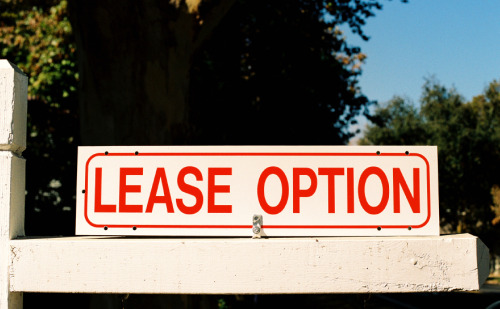Q. What is the difference between a “Rent to Own” or “Lease to Own” and a “Lease Option”, or even “Seller Financing”? I’m so confused!
A. Great question – and this one comes up often lately with Buyers who aren’t quite ready to commit to purchasing a home or have iffy credit. The issue is, many times would-be Buyers think a Rent-To-Own is the best option for them but may actually work in the Seller or Landlord’s favor. Also in almost every scenario you’ll need a significant down payment or deposit for “option” money so if you are short on cash – you may be better off with a straight FHA or VA home loan.
Lease Purchases, Options and Seller Financing are typically offered on hard to sell or overpriced properties. Think about it, if the property was easy to sell (or priced right!), the Seller would sell it to a Buyer who would pay the Seller cash or do a traditional mortgage. Sellers generally get market value at today’s prices or even a bit higher, and relief from paying a mortgage on a vacant property. Although the lease payments may exceed market rent, the Buyer is building a down payment and banking that the property will appreciate beyond the agreed upon purchase price.
Let’s break these down a bit…
Rent-to-Own or Lease-to-Own (also called a Lease Purchase):
- Buyer pays the Seller a deposit or “option” money to purchase the property. This option money may be substantial. A typical amount might be $5,000-$25,000.
- Buyer and Seller agree on a purchase price, often at or a bit higher than market value.
- During the term of the option, the Buyer agrees to lease the property from the seller for a predetermined rental amount.
- The term of the lease purchase agreement is negotiable, but the common length is generally from 1 year to 3 years, at which time the Buyer applies for bank financing and pays the Seller in full.
- The option money generally does not apply toward the down payment and is non-refundable if the Buyer defaults and does not purchase the property. Also as this is a purchase agreement, the Seller can sue for specific performance if Buyer defaults and does not purchase after the term ends.
- A portion of the monthly lease payment typically applies toward the purchase price. How much is negotiable.
- Nobody else can buy the property unless the Buyer defaults.
- Buyers are often responsible for maintaining the property and paying all expenses associated with its upkeep, including taxes and insurance.
- Again – The Buyer is obligated to buy the property at the end of the option or lease period.
Lease Option:
- Buyer pays the Seller option money for the right to later purchase the property. The lease option money may be substantial. A typical amount might be $5,000-$25,000.
- Buyer and Seller may agree to a purchase price now or the Buyer may agree to pay market value at the time the option is exercised. It is negotiable. However, most Buyers want to lock in the future purchase price at the time the agreement is signed.
- During the term of the lease option, the Buyer agrees to lease the property from the Seller for a predetermined rental amount.
- The term of the lease option agreement is negotiable, but the common length is generally from 1 year to 3 years.
- The option money generally does not apply toward the down payment.
- A portion of the monthly rental payment typically applies toward the purchase price.
- Option money is rarely refundable.
- Nobody else can buy the property during the lease option period.
- If the Buyer does not exercise the lease option and purchase the property at the end of the lease option, the option expires.
- The Buyer is not obligated to buy the property.
Seller Financing:
Seller financing is great for those who have iffy credit, but would like to get a traditional mortgage down the road and have some kind of down payment saved. When you ask the Seller to become the bank, they are providing Owner or Seller Financing. If the property has an existing loan, the existing lender might accelerate the loan upon sale due to an alienation clause. Yikes – in this Realtor’s opinion it is best and less risky for the Buyer to only consider Seller Financing on properties that are owned free and clear by the Seller.
- With Seller Financing, the Buyer and Seller agree upon an interest rate, monthly payment amount and term of the loan, and the Buyer pays the Seller on an installment basis. The security instrument is generally recorded in the public records, which protects both parties.
- While there is no standard down payment required, many Sellers want a sufficient down payment to protect their equity and provide them with less risk. Down payments can vary from 3.5% to 20% or more.
- Its not uncommon for a Seller Financing deal to have a higher interest rate than today’s going rates on a 30 year fixed mortgage – but again everything in real estate is negotiable.
- Typically there is a point at which there’s a balloon payment to the Seller. Most Sellers do not want to be the bank for 30 years. The length of time for the balloon to hit could be anywhere from 3 to 10 years, its negotiable between the parties.
In any of these situations, your Realtor should use a Real Estate Attorney to draft such a complex document – these types of transactions are not very common and are not part of our normal real estate forms.



Hi Liane,
Is it possible to do a contract sale of a house that still has a mortgage on it? In other words can a landlord who is renting out a house that is owned by the bank, enter into a contract sale on that house? Or does it have to be a lease option?
I am not sure if you mean a regular contract for sale or a contract for deed. If regular contract for sale, absolutely their can be an existing mortgage which is paid off at closing. However if you are referring to a contract for deed, occasionally, home sellers with existing mortgages have used contracts for deed to sell their homes. However, a mortgage’s due-on-sale clause may prevent the home securing that mortgage from being sold via contract for deed in many states – it’s not common.